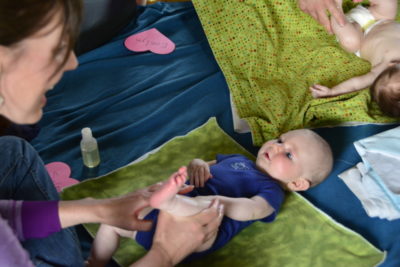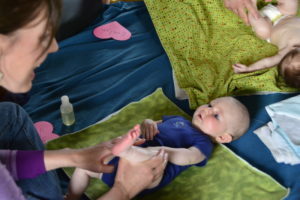
Category: PARENTING

BABY RHYME TIME

BABY RHYME TIME is at 11:00am on Thursdays!
Baby Rhyme Time a socialization group for new parents with very young children (newborn up to 24 months). The group meets weekly at the Grants Pass branch of Josephine Community Library.
The one-hour group provides opportunities for new parents and their babies to meet other families and to learn through sharing ideas and play. We start out singing nursery rhymes with the babies and toddlers for about 20 minutes. Singing nursery rhymes and reading to infants and toddlers enhances their early literacy skills and supports the growing bond between parent and child. The remainder of the hour is spent playing and socializing.
Baby Rhyme Time was designed to give new mothers a place to get together on a regular basis for socialization and support. One in four new mothers suffer from depression, anxiety or panic disorders before or after their pregnancy. Symptoms may include trouble sleeping, crying, irritability or nervousness, changes in appetite, feeling fearful and lack of interest in the baby, family or friends. Many new mothers are socially isolated in the first few months after their baby is born, which can contribute to postpartum symptoms. Getting together with other mothers is a great way to alleviate social isolation. Dads and grandparents are welcome to come too. The group is free and meets every week.
Please NOTE: Baby Rhyme Time meets prior to the opening of the library to the public. Participants must enter through the back door of the library (on the West side) and follow the signs to the children’s library.
Find us on Facebook at Baby Rhyme Time – Grants Pass.
For more information contact:
Kelly Carter, LPC of SOESD/Early Childhood Services, (541)956-2059 x 4726
Bo Alderton from the Family Support & Connections program, (541) 474-3101 x232.


Be A Super Hero: Reduce the Risk of Sexual Abuse Of the Children In Your Life
One of the most anxious moments of my adult life was the first day I left my then two month old son in the hands of his daycare provider so that I could go back to work. I knew what the risks were for my son. I had worked in the field of child protection for nearly twenty years at that time. I had seen the dark side of humanity and was feeling very overwhelmed at the daunting task of keeping my child safe from all harm.
Many parents face this same dilemma. While there is nothing we can do to totally guarantee our child’s safety there are things that we can do to reduce the risk.
One of the most important things that you can do to reduce the risk of sexual abuse of your child is really quite simple.  Listen to your child. Talk to your child.
Listen to your child. Talk to your child.
Not in the distracted I am busy kind of way but really take time every day to be present in your child’s life. Pay attention to all the small stuff so they will come to you with the big stuff. This will let your child know that you care about him. It also builds self esteem.
Many children who are sexually abused are vulnerable because they lack self worth. If they are not getting that attention from you, they may seek that attention from someone whose intentions are not pure. Another very important thing that you can do is when you are looking for a child care provider, do your homework.
If you are using a daycare facility you should inquire about their employee screening process. You should make sure that it includes a thorough background check.
If you are using an in home provider then you should require that anyone you hire have a background check.
If you are a single parent and are bringing other adults or older children into your child’s life, make sure that you know them and know what their backgrounds contain.
You should be very selective about who spends time alone with your child. As a parent you should educate yourself about the signs of abuse and follow up if you think that you are seeing any of these signs.
If you do not know what to do, then seek advice from a professional at the Jackson County Children’s Advocacy Center. You can learn the signs of abuse by taking a Darkness to Light class at the Children’s Advocacy Center of Jackson County. 
Tammi Pitzen
Executive Director
Children’s Advocacy Center of Jackson County

As a parent one of the hardest things I have had to do was teach my child how to talk about feelings. The conversation was not hard but teaching the skill has been off the scale in terms of difficulty. The gift of being able to articulate what you feel and what you want is one of the most important things you can do for your child’s  emotional well-being.
emotional well-being.
There are some simple things you can do to help your child be successful in this endeavor. One thing you can do is to not discount whatever he tells you about what he is feeling.
For example if your child tells you that he is angry about something, do not tell him he should not be mad. Instead, ask him about what is making him angry. Help your child identify feelings and emotions by using facial expressions, feelings posters, or using books. There are some great books about emotions for even very young child that use facial expression. It is a great way to start the conversation and to start to identify what feelings look like and feel like.
Another way to teach a child about feelings and talking about feelings is to model that behavior for them. Talk about how you are feeling. Children learn behaviors and what is acceptable by watching the adults in their life. If you get in the habit of talking about your feelings in front of your child, then they too will begin to talk about feelings. Be appropriate when doing so as we all know what great imitators children can be. An example could be “I am feeling really happy today because you cleaned your room” or “I am sad because you are not feeling well today”.
Show empathy with your child. A good example might be “I can see you are feeling sad and disappointed that you will not be able to go to the park today because it is raining.” Of course help your child to practice this skill by listening to him and asking him questions about his day and how he is feeling.
 Be interested in what he has to say. This is such an important skill to teach. When children are frustrated because they cannot find the right words to express what they are feeling many times we will see anger, sadness and maybe a tantrum or two. This is a great excise that will allow you and your child to increase communication and social skills.
Be interested in what he has to say. This is such an important skill to teach. When children are frustrated because they cannot find the right words to express what they are feeling many times we will see anger, sadness and maybe a tantrum or two. This is a great excise that will allow you and your child to increase communication and social skills.

Celebrate Meal Time With Your Family!
By Elycia Bechard, LPC
Therapist at The Children’s Advocacy Center of Jackson County
As families gather together for the holidays it can be a great opportunity to step back and remember the importance of connection. If you are fortunate enough to have positive memories from your childhood experience of family meals, try to remember how those moments of learning, connection, or modeled behaviors affected you or shaped who you are today. I frequently hear from parents their difficulties in trying to juggle their many responsibilities: children, partner, family, work, etc., so here are some fun, exciting ideas you can use while eating together as a family to develop or re-establish deeper connection with your child.
The goal is to get away from the TV and make dinner time fun for the whole family. If children choose not to participate, that is okay. Parents modeling smiling, laughing and having fun can motivate children to participate!
- The Microphone Game — Give everyone a chance to share about their day by passing around an object that serves as a microphone. When someone has the microphone, they have the floor – meaning all others are listening! This technique can be a great opportunity to slow things down and make time to listen to one another. It provides a space where children who might have difficulties trying to get out their thoughts and words have the time and space to share.
- Play with your food! — I know, I know. This goes against everything we have been taught growing up. Play at the table, however, can assist in making a comfortable atmosphere where your children feel they can share about their day.
- Food Shapes — Make ordinary meals into fun shapes, faces, or designs, such as the smiley pancake, funny faces spaghetti, or an all time favorite – ants on a log. There are tons of ideas on-line if you need inspiration!
- Themed Dinners – Pick a type of cuisine (Italian, Mexican, etc.) and imaginatively travel to the country with music, dress or décor. Perhaps your son loves Spiderman. Plan a meal for Spidey and bring Spiderman toys to the table as décor. You could do something similar themes like the “Frozen” movie, dinosaur adventures, and Minecraft explorations.
- New Ideas — Ask your children if they have an idea or favorite game they learned from school to try at the dinner table!
- Celebration Meals — Celebrations need not just be held for holidays. Have a celebratory meal for getting a good report card, passing a test, taking off training wheels on a bike, or having a successful work week. Celebratory meals do not need to be expensive either, but can be about making that family member’s favorite meal.
- Book-Inspired Meals — Choose a recipe from your favorite book or movie – Green Eggs and Ham, The Very Hungry Caterpillar, Harry Potter’s Pumpkin Juice, Cloudy with a Chance of Meatballs, James and The Giant Peach, The Stinky Cheese Man, Ratatouille, etc. Read from the story during dinner!
- Kids in the Kitchen — Have your child choose a meal they would like to try and have them help you pick out the
 ingredients at the grocery store as well as in the kitchen. This can be helpful for children with persnickety eating habits to feel a sense of control and value.
ingredients at the grocery store as well as in the kitchen. This can be helpful for children with persnickety eating habits to feel a sense of control and value.
- Create a story together. – One person starts a story with one sentence. (Once upon a time….) Each family member then adds one additional sentence until the story has gone around the table. You can write down the story and read it aloud at the end of dinner for a great laugh.
- Set the Mood — Play music, light candles, dress up a bit – all these changes can suddenly make dinner a special event.
- The Dinner Guest – have each family member share one person from any time period that they would like to invite to dinner and then share why. This can be fun for parents to hear about what their children are learning in school and who their child shows interest in.
- Telephone Around The Table – Keep those cell phones on vibrate! I’m talking about the classic game where one family member thinks of a phrase and whispers it to their neighbor until it has travelled around the table to see how close the phrase got!
- Family Game Night — Pretend your family is on a Food Network TV show like Iron Chef, Chopped, etc.
- Eat the Alphabet – Try to eat something that starts with every letter of the alphabet: Apple, Banana, Carrot, etc.
A wonderful starting place is to sit down and figure out how often you could potentially incorporate one of these fun, new ideas into mealtime, and most importantly be consistent. If you can plan to do it once a week, once a month, or any other amount of time, that is terrific. Create a schedule where your children have something fun to look forward to. Overall, enjoy each other and have FUN!

 Infant Massage:Bonding and Benefits for Parents and Babies
Infant Massage:Bonding and Benefits for Parents and Babies
By JoAnn Lewis, LMT, CEIM, Trainer with the International Assoc. of Infant Massage, Sweden, USA chapter.
Evidence keeps pouring in to show us that loving, nurturing touch between baby and parent is essential to our baby’s best development in all ways. The stimulation, relaxation, relief and interaction of infant massage all play an important part in baby’s emotional, intellectual and physical well-being that lasts a lifetime.
At the Touch Research Institute in Miami’s University Medical Centers, research shows premature babies given daily massages for 15 minutes gain 47% more weight and go home in half the time with savings upwards of $9,000 to the hospital and the parents! This is just one of many studies illustrating the  advantages of infant massage in
advantages of infant massage in  reducing colic, sleeping problems, and stress hormones. It is found to improve nerve coatings, digestion, brain development, muscle tone, immune function and much more…
reducing colic, sleeping problems, and stress hormones. It is found to improve nerve coatings, digestion, brain development, muscle tone, immune function and much more…
Touch is the first sense we develop while still inside our mothers and the strongest since birth. And we continue to need touch all of our lives for well-being.
At every class in infant massage the parents and babies learn about each other together with this ancient traditional way of communicating through touch, “dancing” and relaxing in deep harmony with respect to each other. It is the lovely dance of massage! Parents can really relax for the first time with each stroke as their baby responds to their touch, their voice, and their complete, loving attention. This simple and strengthening nourishment of massage builds their confidence, their bodies, their trust in each other; setting a strong foundation for life!
attention. This simple and strengthening nourishment of massage builds their confidence, their bodies, their trust in each other; setting a strong foundation for life!
Call the Family Massage Education Center at 77 Manzanita Avenue in Ashland, Oregon for a schedule of parent/baby classes at 541-482-3567. Or call to become an educator/instructor of infant massage at the next certification USA training in Ashland with JoAnn Lewis, USA Trainer.
http://www.hellofmec.com/

Free Basic Training for First Time Fathers
How did you first learn to change a diaper, burp an infant, console it, or pack a diaper bag? I’m the eldest of five children, so in my case, it was tending siblings during the rare times my parents went on “date-night.” And I did a fair amount of childcare for other families to earn spending money.
It shouldn’t surprise you to hear that today, women have fewer children, they have those children later in life, and according to most data, 41% of those children are going to be raised by a single parent. Often that single parent will juggle both a low-wage job and childrearing. So it won’t surprise you that locally, 85% of children and youth qualify for free or reduced school lunch. 70% of youth in custody did not grow up with both parents. Generally, raising kids falls disproportionately to women. They are, traditionally, culturally, and arguably biologically, the better-suited caregivers. 72.5% of those accused of shaken baby syndrome crimes are men. Yet with more women going to college and graduating from college, women are now often the primary breadwinner. Add these findings together, and there is a need to teach men how to raise children.

As a teacher, I see the effects of kids raised in poverty daily. Many crave even negative attention from adults. They are often hungry, and often unsupervised at night, staying up to morning hours to play video games. 24% of our middle schoolers will miss 10% or more days of school in our state. Often, their reading and math skills and motor skills are behind grade level because from a young age, their caregivers are unable to afford certain toys, books, internet access, sports fees, etc. that wealthier families are.
We can either sigh and lament these statistics, or we can recognize that we are not preparing men well for two realities: 1) they will want to leave a relationship when they find out that they aren’t able to provide their family with the level of financial support that they would like to, and 2) by staying, they can provide their families with far more than financial support.
With a few weeks of my 2015 summer vacation left, I heard an NPR broadcast that taught gang members who never had fathers— how to _be_ fathers. A few phone calls later, I had financial support from AllCare to become a facilitator and establish a chapter of “Boot Camp for New Dads” in Grants Pass and Medford.
Boot Camp’s motto is: “A father for every child, no matter what.” The 3-hr. course uses “veteran dads” who have 2-12 month old babies— to teach “rookie dads”— those who are soon to deliver. It covers fears that fathers have, and how to form a parenting team; how to react when/if the female shuts out the dad as “not competent enough” to care for the child. Rookies change diapers of the veteran dad’s children; learn how to console— and they learn how to nurture their relationship with a newly hormonal, overtired mom. Changing diapers, consoling, taking the child to a park, and reading or singing to it will give her relief rest that she desperately needs.
It’s one thing to have the perfect class available at the perfect time. It’s quite another to have a gender that prides oneself on their independence— _sign up_ for the course. In Grants Pass, there are 25 distribution points where an expectant father would come across our brochures: Women’s Health Center, Southern Oregon HeadStart, Options, Child Welfare Services, and Pregnancy Care Center, are just a few.
If you know of an expectant (i.e. “rookie”) father, please tell them to register via our website: www.gpbootcampfornewdads.com.
Enthusiastic, proud veteran fathers will be ready to impart their wisdom on the 2nd Saturday of every month, at the Women’s Health Center off Ramsey at 1075 Grandview Ave. in Grants Pass, 9-12 am and from 1-4pm at La Clinica Wellness Center, 730 Biddle Road in Medford.
By Bob Bath.

 I have seen twenty-one of our beautiful nation’s states and fourteen other countries. When I had my wee one less than two years ago, I knew I was not going to compromise my love of travel for the sake of parenthood. Our son got his first passport stamp at eight months, and will add four more at the age of two this Spring.
I have seen twenty-one of our beautiful nation’s states and fourteen other countries. When I had my wee one less than two years ago, I knew I was not going to compromise my love of travel for the sake of parenthood. Our son got his first passport stamp at eight months, and will add four more at the age of two this Spring. I live. Visiting new places gives him confidence and removes possible fears.
I live. Visiting new places gives him confidence and removes possible fears.

